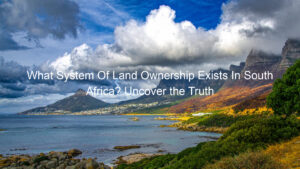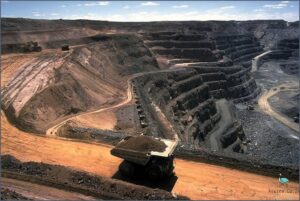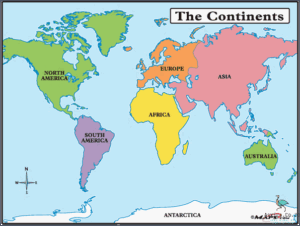
There are three main systems of land ownership in South Africa: private ownership, communal ownership, and state ownership. Private ownership is the most common form of land ownership, and refers to land that is owned by individuals or companies. Communal ownership is land that is owned by a community or group, such as a tribe or village. State ownership is land that is owned by the government.
Contents
What System Of Land Ownership Exists In South Africa
South Africa has a system of land ownership that is based on private ownership. Land is owned by individuals, businesses, and other organizations and is subject to the same property laws as other countries. The South African Constitution protects private property rights of individuals, and the Land Reform Program has been enacted to protect the interest of the previously disadvantaged groups. The Land Reform Program seeks to correct racial and gender inequalities in land ownership, including the redistribution of land to those who were previously disadvantaged. Land reforms are also in place to encourage rural development, by providing access to land for agricultural and other activities. The South African government also offers incentives to individuals and companies to invest in land, with the aim of creating jobs and stimulating economic growth.
Overview of Land Ownership in South Africa
Land ownership in South Africa is a complex and evolving issue. Over the years, the legal system has seen drastic changes in the way land is held and who can own it. As the country moves forward, new regulations and laws are being implemented to ensure that everyone has an equal right to access and benefit from land.
In South Africa, there are three main systems of land ownership: communal ownership, private ownership, and state ownership. Communal ownership, also known as tribal land, is administered by chiefs and is held by the community as a whole. Private ownership is held by individuals or companies and involves the use of deeds. State ownership, which is owned by the government, includes public land, reserves, and national parks.
Communal land has always been an integral part of South African society, and it is protected by the Constitution. This type of land is held by the community and is used for housing, farming, grazing, and other activities. The National Land Act of 1913 recognized the right of tribal chiefs to administer communal land. However, this right is not absolute and can be subject to change.
Private land ownership has been gradually increasing in South Africa. Generally, private land is bought and sold using deeds and registered at the Deeds Office. This type of land can be subject to zoning regulations, heritage protection, and other restrictions.
State land ownership is managed by the Department of Agriculture, Forestry and Fisheries. This includes public land, reserves, and national parks. Public land is open to the public and is used for recreational and conservation purposes. Reserves are designated for specific purposes such as farming and grazing. National parks are set aside for conservation and recreation.
Overall, the system of land ownership in South Africa is evolving and becoming increasingly complex. It is important for everyone to understand the different types of land ownership in South Africa and the laws and regulations that govern it. This will ensure that everyone has an equal right to access and benefit from land.
Types of Land Ownership in South Africa
South Africa has a unique system of land ownership that has evolved over the years to accommodate its diverse population. In this article, we will explore the various types of land ownership in South Africa, from communal ownership to private ownership.
The most common form of land ownership in South Africa is communal ownership. This type of ownership is typically held by rural communities and is based on traditional customs and practices. Under this system, land is held in common by all members of the community, who can use it for agricultural or other economic activities. However, the community as a whole retains ultimate control over the land, and individual members cannot sell or transfer their rights to it.
Another type of land ownership in South Africa is private ownership. This type of ownership is based on individual rights, and individuals can buy, sell, and transfer ownership of land as they wish. This type of ownership is most common in urban areas and is often used to build homes or businesses.
The third type of land ownership in South Africa is state ownership. This type of ownership is usually held by the government, and it can be used for public works projects, such as roads, dams, and schools. The government may also expropriate land for public use, such as parks and reserves.
The final type of land ownership in South Africa is leasehold ownership. This type of ownership gives individuals the right to use and occupy land for a specific period of time, usually in exchange for rent or other payment. This type of ownership is common in urban areas, where land is often leased for commercial or residential use.
Each of these types of land ownership has its own set of rules and regulations that govern how they are used and managed. It is important to be aware of these rules and regulations when purchasing or leasing land in South Africa. Understanding the different types of land ownership in South Africa can help you make the right decisions when it comes to purchasing or leasing land.
Historical Context of Land Ownership
South Africa has a long and complex history of land ownership that dates back centuries. From precolonial times when the land was owned by multiple African tribes to the colonial period when it was controlled by the British and Dutch, land ownership in South Africa has been contentious and contested.
During the precolonial period, land ownership was largely communal, with African tribes owning and managing the land. These tribes had their own systems of governance, with leaders who managed the land and distributed its resources. This system was largely respected and allowed for a certain degree of autonomy among the tribes.
The start of the colonial period brought with it a system of land ownership based on private property. The British and Dutch colonizers implemented a system of land tenure where they held the title to the land and could grant concessions to individuals. This system of land ownership was seen as a way to consolidate power and control over the African population.
In the 19th century, the British and Dutch began to grant concessions to white settlers, who were given the right to own and use large tracts of land. This system of land tenure was highly unequal, as the African people were largely excluded from the process and were not allowed to own land.
In the 20th century, the system of land ownership in South Africa underwent major changes. The National Party, which came to power in 1948, implemented a system of racial segregation and apartheid. This system of racial segregation denied the African population access to land ownership, which was reserved for white people.
In the post-apartheid era, South Africa has implemented a system of land reform which seeks to address the legacy of racial inequality in the country. The government has implemented programmes to redistribute land to the African population and to provide access to land for the poor. In addition, the government has implemented policies to protect the rights of traditional communities and to promote sustainable development.
Despite these efforts, land ownership in South Africa remains highly unequal, with a large proportion of the land still owned by white people. Many African people still don’t have access to land and are unable to benefit from the agricultural and economic opportunities that it provides. In order to address this inequality, it is essential that the government continues to implement policies to promote equal access to land and to ensure that all South Africans benefit from the country’s natural resources.
Conclusion
In conclusion, South Africa has a complex system of land ownership which is divided into three main categories: state-owned land, communal land, and private land. State-owned land is managed by the national government and includes land used for infrastructure, public buildings, and parks. Communal land is owned and administered by traditional communities, such as the African tribes, and is mainly used for farming. Private land is owned by individuals or companies, and is used for both residential and commercial purposes. All these different types of land ownership are regulated by the South African government and are subject to the country’s laws and regulations.




